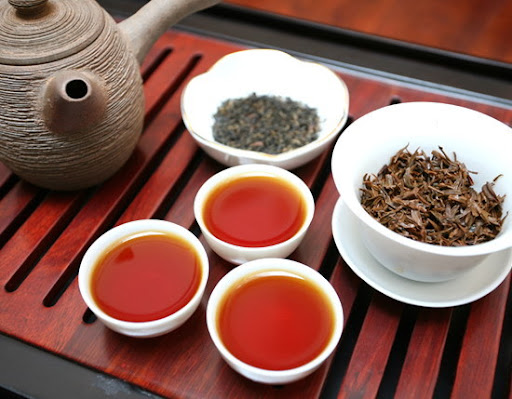Can black tea kill Helicobacter pylori? The efficacy and function of black tea taboos and unsuitable people
Health benefits
1. Promote heart health
Many studies have shown that black tea has a positive effect on heart health. A study published in 2017 examined the effects of tea drinking on the risk of ischemic heart disease. The study surveyed more than 350000 men and women aged between 30 and 79 in 10 regions of China.
When the researchers followed up about seven years later, they found that tea drinking was associated with a lower risk of ischemic heart disease and a lower risk of major coronary artery events, such as heart attacks.
Another study compared people who drank black tea (without additives) and plain boiled water for 12 weeks. It contains a large number of flavane-3-ol, flavonol, theaflavins and Gallic acid derivatives. The researchers found that drinking 9 grams of black tea a day "significantly reduced" cardiovascular risk factors, including triglyceride levels and fasting blood sugar.
In addition, the ratio of LDL to HDL also decreased significantly, while the cholesterol level of HDL ("healthy") increased. Overall, the researchers concluded that drinking black tea "in a normal diet" reduces major cardiovascular risk factors and increases antioxidant levels.
two。 To help fight cancer.
Anti-cancer is also on the list of benefits of black tea, because drinking black tea can reduce some types of cancer. First, a study published in 2013 in the American Journal of Epidemiology (American Journal of Epidemiology) investigated the effects of black tea rich in flavonoids on prostate cancer risk among more than 58000 men in the Netherlands, providing detailed baseline information on several cancer risk factors.
Black tea is considered to be the main source of health-promoting flavonoids, such as catechin, epicatechin, kaempferol and myricetin. Studies have shown that increased intake of flavonoids and black tea is associated with a lower risk of advanced prostate cancer. However, no correlation was observed in the overall and early stages of prostate cancer.
Another promising study published in 2016 showed that theaflavins-3 found in black tea had a strong ability to prevent the growth of cisplatin-resistant ovarian cancer cells. This is an impressive discovery because cisplatin is called "one of the most effective broad-spectrum anticancer drugs". In addition, theaflavins-3 is less toxic to healthy ovarian cancer cells, which is awesome because many traditional anti-cancer drugs kill cancer and healthy cells.
3. Help reduce the risk of diabetes
Diabetes is a growing chronic health problem in the world. A study published in the journal Diabetes wants to understand the relationship between tea (and coffee) intake and the development of type 2 diabetes. The study involved 4011 participants, and during an average follow-up of 10 years, the researchers found that 918 subjects developed type 2 diabetes.
They also found that drinking tea and coffee reduced the risk of developing type 2 diabetes. Specifically, drinking at least three cups of tea or coffee a day can reduce the risk of type 2 diabetes by 42%. This makes black tea beneficial as part of the diabetes diet plan.

4. May avoid stroke
A meta-analysis published in 2009 found that drinking black or green tea every day can prevent ischemic stroke. Specifically, the researchers found that people who drank the equivalent of three or more cups of tea a day had an overall 21% lower risk of stroke than those who drank less than one cup of tea a day, regardless of the country of origin of the study.
5. Relieve stomach discomfort
If you have an upset stomach and are experiencing diarrhea, a good cup of black tea may be the answer. Tannic acid has a converging effect on the inner wall of the intestinal tract, which helps to alleviate intestinal inflammation and control diarrhea.
If you are worried about getting dehydrated, you can choose decaffeinated black tea. A 2016 study showed that black tea tablets are not only effective, but also a safe and cheap way to control non-bacterial diarrhea in patients between the ages of 2 and 12. (9)
6. Have the ability to resist bacteria
Black tea is not only a hot or cold drink, it also has strong antibacterial and antioxidant ability. Studies have shown that its phenolic compounds and tannic acids have the ability to inhibit some types of bacteria. In addition, non-polymer phenolic compounds can be absorbed by the gastrointestinal tract, making these bactericidal ingredients in black tea active in the oral cavity.
Black tea drunk with honey has also been shown to specifically kill Helicobacter pylori, which can prevent a variety of unwanted Helicobacter pylori symptoms, including ulcers.
7. Reduce stress hormones
This is definitely one of my favorite black tea benefits. Coffee is known to cause some people to have a bit of excess energy, while tea is a more balanced source of caffeine and even a relaxing drink that relieves stress. Studies have shown that by reducing stress hormones such as cortisol, it can actually help drinkers better recover from the stress of daily life.
In one study, 75 healthy male tea drinkers with an average age of 33 were divided into two groups, each of which gave themselves their usual caffeinated drinks. Six weeks later, one group consumed a fruit-flavored coffee-tea mixture of active ingredients in a cup of tea, while the other group drank a drink that tasted the same, and the same level of caffeine did not contain any other active tea components.
Then, the subjects experienced stress-induced situations similar to those they experienced in normal life. The researchers recorded their stress hormones, blood pressure levels, heart rate and self-reported stress levels.
What did they find? According to all monitored health variables, these tasks certainly led to stress, but 50 minutes after stress, cortisol levels in the real black tea drinking group were significantly lower than those in the sham tea drinkers. Compared with the fake tea group, real tea consumers also felt more relaxed after stressful events.
In addition, there is a positive result of the study-black tea drinkers have lower levels of platelet activation, which is associated with thrombosis, which increases the risk of heart attack.
Additional benefits
Here are some oral black teas that have been scientifically proven to be beneficial to the following health problems:
Headaches and mental alertness: up to 250 milligrams of caffeine a day can relieve headaches and improve mental alertness
Heart disease and kidney stones: drinking at least one cup of black tea a day can reduce the risk of heart disease and kidney stones
Atherosclerosis: drinking 1-4 cups (125-500 ml) of black tea a day can prevent atherosclerosis
Parkinson's disease: men who consume 421 to 2716 milligrams of caffeine (about 5 to 33 cups of black tea) a day seem to have the lowest risk of developing Parkinson's disease. However, men who drank 124 to 208 milligrams of caffeine (about 1 to 3 cups) a day were also significantly less likely to develop Parkinson's disease. For women, one to four cups a day seems to be the best.
Alzheimer's disease: a recent study of Chinese people over the age of 55 in 957 found that "regular consumption of tea reduces the risk of cognitive decline by 50%. The risk of apolipoprotein E4 gene carriers who suffer from Alzheimer's disease may experience a reduced risk of cognitive impairment as high as 86%."
I would like to point out that I certainly do not recommend drinking 33 cups of black tea every day. We treat caffeine in different ways, but in general, we don't recommend consuming more than 5 cups (40 ounces) of caffeine a day.
Important Notice :
前街咖啡 FrontStreet Coffee has moved to new addredd:
FrontStreet Coffee Address: 315,Donghua East Road,GuangZhou
Tel:020 38364473
- Prev

Latest developments in Taiwan Coffee International auction for Geisha Coffee reached a record of 14000 per pound
The first PCA raw bean auction in Taiwan's coffee history reached a high price of US $500.5 per pound (about NT $10, 4000), Yahoo yahoo reported. And the identity of the buyer, which attracted a lot of attention, was also revealed on September 3. The identity of the buyer was four domestic coffee manufacturers who worked together to keep Taiwan's champion coffee under the highest price, namely the founder of Pebble Coffee Zhuang Jiabang and the founder of Heiwo Coffee Lin.
- Next

What is the difference between black tea and green tea and white tea? what is the correct brewing method of black tea with a fair cup tea set?
Black tea, green tea and white tea black tea, green tea and white tea all have the same tea source, that is, tea tree. The processing of tea makes tea have different color, flavor and health care effect. After picking, the processing degree of white tea is the lowest, while that of black tea is the highest. White tea is the closest you can get to picking tea from plants. It has a very oxidizing effect.
Related
- Unexpected! Ruixing Telunsu lattes use a smoothie machine to foam milk?!
- % Arabia's first store in Henan opens into the village?! Netizen: Thought it was P's
- Does an authentic standard mocha coffee recipe use chocolate sauce or powder? Mocha Latte/Dirty Coffee/Salty Mocha Coffee Recipe Share!
- What is the difference between Vietnam egg coffee and Norway egg coffee? Hand-brewed single product coffee filter paper filter cloth filter flat solution!
- What is the difference between sun-cured and honey-treated coffee? What are the differences in the flavor characteristics of sun-honey coffee?
- How to make Italian latte! How much milk does a standard latte use/what should the ratio of coffee to milk be?
- How to make butter American/butter latte/butter Dirty coffee? Is hand-brewed coffee good with butter?
- Is Dirty the cold version of Australian White? What is the difference between dirty coffee/decent coffee and Australian white espresso?
- Relationship between brewing time and coffee extraction parameters How to make the brewing time fall to 2 minutes?
- Got entangled?! Lucky opens a new store, Mixue Ice City, and pursues it as a neighbor!

